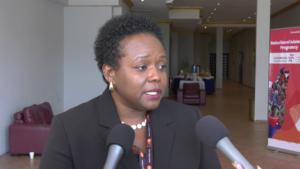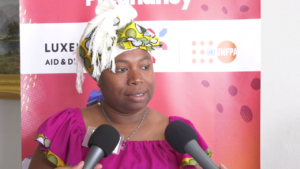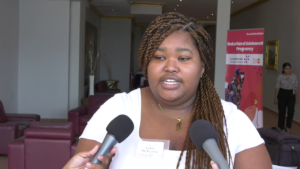Putting an End to Teen Pregnancy in Belize
For years, adolescent pregnancy has been an issue that Belize has been trying to reduce in vulnerable communities. Despite attempts made to increase use of contraceptive methods, Belize continues to have one of the lowest usages, with a high adolescent birth rate. This year, a new program is being implemented to counteract the issue. The Leave No One Behind, the Reduction of Adolescent Pregnancy in the Afro Descendant, Creole, Garifuna, and Miskito Peoples of the Caribbean Coast of Central America is being implemented in Belize through the United Nations Sexual and Reproductive Health Agency. Today, a workshop was held with various organizations to bring attention to the data and discuss the implementation of this initiative. News Five’s Britney Gordon reports.
Britney Gordon, Reporting
Belize’s adolescent pregnancy rate continues to be one of the highest in the Latin American and Caribbean region. Despite the Ministry of Health’s efforts to provide contraception, adolescent usage is the lowest among Belizean women, and they have the highest unmet need for family planning. Around eleven percent of Belize’s adolescent girls, age fifteen to nineteen years, have had a baby. As concern over this issue increases, the need for intervention became more apparent. Thus, a program was launched to proactively reduce the numbers. Head of office for the United Nations Sexual and Reproductive Health Agency in Belize, Tisa Grant, spoke to us about the integration of the program.

Tisa Grant
Tisa Grant, Liaison Officer, UNFPA in Belize
“This workshop is a part of one aspect of a regional project being implemented in Central America. The project is funded by the Duchy of Luxembourg. It’s called Leave No One Behind, the Reduction of Adolescent Pregnancy in the Afro Descendant, Creole, Garifuna, and Miskito Peoples of the Caribbean Coast of Central America. So it’s a very long name, but essentially the project aims to reduce adolescent pregnancy in select countries in Central America. Belize is one of the recipients of funding for this project. And so here in country we are implemented in three districts, Toledo, Stann Creek and Belize districts.”
 According to data from the United Nations Population Fund, teen mothers are more likely to drop out of school, live in poor housing conditions, and be unemployed or in low-paid employment. As a result, their children are more likely to live in poverty, become involved in crime, and abuse drugs and alcohol. At the workshop stakeholders were able to gather and discuss the impact of teen pregnancy, analyze data and discuss the roadmap for implementing solutions in country.
According to data from the United Nations Population Fund, teen mothers are more likely to drop out of school, live in poor housing conditions, and be unemployed or in low-paid employment. As a result, their children are more likely to live in poverty, become involved in crime, and abuse drugs and alcohol. At the workshop stakeholders were able to gather and discuss the impact of teen pregnancy, analyze data and discuss the roadmap for implementing solutions in country.
 Tisa Grant
Tisa Grant
“We felt that it was important to have a wide cross section of stakeholders. particularly those who work in the response, um, to, um, reducing adolescent pregnancy, but also organizations that work with young people in general. So we’ve invited the ministry of health. We have, um, civil society organizations like BFLA, we have POWA, we have YWCA, we have a long list of civil society organizations and government representatives from the ministry of education, ministry of health, and. If I start listing, I may miss one of them. It was really about having a wide cross section of stakeholders that would be able to learn about this tool that was developed by UNFPA, by our Latin American and Caribbean regional office. The tool is called an Impact Evaluation Goal Model, and what it aims to do is to assess the impact of policies on the reduction of adolescent pregnancy and alternatives that would allow for access to services, but also access to information such as sexuality education and so forth.”
Southern Belize is highly affected by adolescent pregnancy. Vice President of the National Garifuna Council, Ifasina Efunyemi, said that the goal is to increase access to resources, sexual education and guidance for young women. The project emphasizes a proactive approach to preventing these unplanned pregnancies.

Ifasina Efunyemi
Ifasina Efunyemi, Vice President, National Garifuna Council
“If you were able to be a part of some of the data that was shared, we know that a lot Garifuna, young persons in districts specifically are among the highest when it comes to the rates of adolescent pregnancies in the country. And so all the ripple effects of that, all the issues we have in terms of nutrition, uh, maternal health, when you look at dropout rates, you look at other social issues that are related. to children having children or young people having children. We are impacted by those in our communities. And so it’s important for us to know what the data is saying so that that can inform the activities that we do, the kinds of interventions that we can have as an organization, because we know that when it comes to educating our community, we have an important role to play as an organization, as the National Garifuna Council.”
She said that that through the spread of data, organizations will be able to accurately determine how much resources are needed in each community.
 Ifasina Efunyemi
Ifasina Efunyemi
“I am very pleased to have been given the opportunity to be in this gathering to get this information and also to learn of the information system that’s going to be implemented because it means that we can input that data and get some feedback on what are the projections if we’re able to provide contraceptive methods to our population so that we don’t have young people having children anymore that they are able to delay that Until they are adults, until they have already established themselves and can actually take care of themselves in a family, then we need to know what all we need to do, how many IUDs or how many implants, whatever it is that they need as a contraceptive method. What do we need to use so that we don’t have fifteen- to nineteen-year-olds having children?”
Gilda Mackenzie, of the Productive Organization of Women in Action, said that sessions like these assist organizations on their mission to ensure the safety and wellbeing of women in the country.

Gilda Mackenzie
Gilda Mackenzie, Representative, Productive Organization of Women in Action
“The purpose that I’m here today, a part of the Impactful Estimation Model is to basically learn more about the project as we are here to advocate for our community. We work along with women and girls advocacy programs. We do community outreach. So it’s really nice to be a part of today’s session. We also talk about pregnancy within the age group as well. We wanted to ensure that we are spreading awareness about the situation. We also want to ensure that we are properly educating our women and girls in our community as well.”
Britney Gordon for News Five.







Facebook Comments